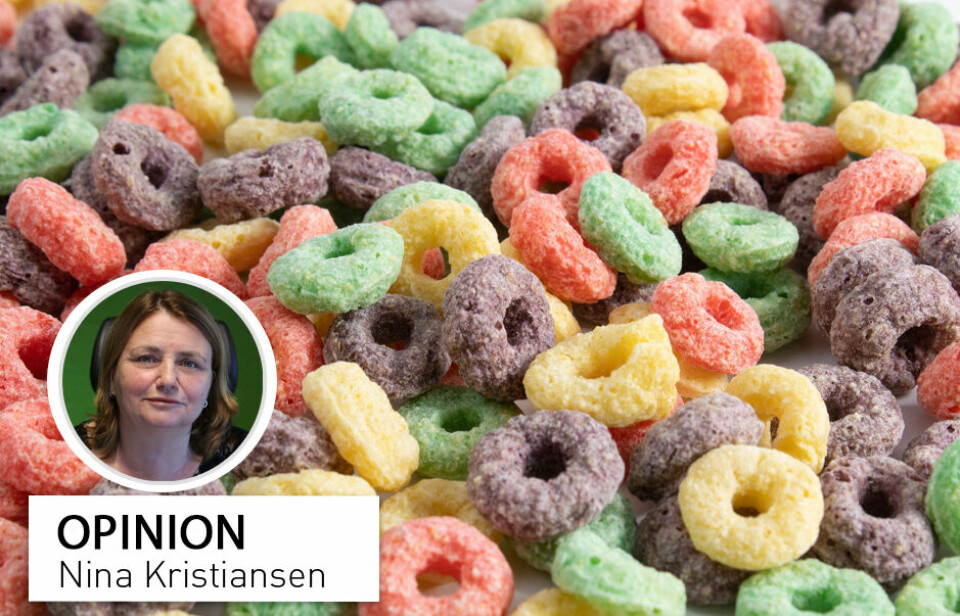
We are not sure, says the researcher who has convinced many that ultra-processed food makes people fat and unhealthy
OPINION: Kevin Hall is behind the study on ultra-processed food that everyone is talking about. But how convinced is he himself that the processing of food is the cause of obesity and disease?
In 2019, Kevin Hall conducted a study that has been cited by researchers all over the world. It is mentioned in scores of newspaper articles and books. The study is presented as the ultimate proof that ultra-processing does something to the food, that it causes obesity and lifestyle diseases.
There are two reasons why Hall's study is so widely discussed.
One is that it is considered a good study, properly conducted with clear results.
The second reason is that the study stands quite alone.
Processing means everything
14 years ago, Brazilian researchers launched a new theory about food. They called it the NOVA system and divided all food into four. The fourth category – the food we should avoid – they called ultra-processed.
The theory is based on two things:
- What the food consists of matters less. It is the processing that determines whether the food is healthy or not.
- And it is also a criticism of the food industry that churns out highly processed products made from cheap raw materials with the aim to make as much money as possible.
The theory of ultra-processed food took the world by storm. It was something completely new. Until then, we had learned that it was the nutrients in the food that were important: Whether it contains carbohydrates, fat, fibre, proteins, vitamins, and minerals. Whether the food is fatty, sweet, and salty.
People gained weight from ultra-processed food. But the study does not answer the most important question.
Now, suddenly, it was the degree of processing we were supposed to look at.
It’s no wonder that nutritionists protested. Food research and health advice are built on assessments of nutritional content. Should that no longer matter?
Then came the research.
What is related to what?
Most viewed
Nutritionists gather information from large health registries, or they send out surveys. Then they look for correlations between people's eating habits, disease, and obesity.
Researchers who believe that the processing of food is the answer will point out that those who eat a lot of ultra-processed food often have obesity, diabetes, heart diseases, and certain types of cancer.
More traditional nutritionists will emphasise that those with obesity and these diseases eat food with a lot of fat, salt, and sugar.
Such studies can’t really provide answers. What actually causes what?
That is why Kevin Hall's study was so welcome.
Complete control of 20 participants
Hall and his colleagues took complete control over the food for 20 people. They lived at the research centre and were monitored around the clock.
In this way, the researchers could eliminate all temptations and distractions. One problem was solved, as even when researchers send people home with a specific diet, it happens that they do not follow it or secretly eat other foods.
For two weeks, participants ate a diet where almost all calories came from ultra-processed foods. For the next two weeks, they switched to a diet where none of the calories came from ultra-processed foods.
The food in the two diets was as similar as possible in nutritional content and calories. Participants could eat as much or as little as they wanted. They did not know what the study was about and did not know that the researchers measured how much they ate of which food.
It turned out that participants consumed 500 more calories per day and gained one kilogram over the two weeks they ate ultra-processed food. When they were on the other diet, they lost one kilogram.
It doesn't get any clearer than that. That’s why this study has become so famous.
What does Kevin Hall think now?
It was therefore interesting to hear how Kevin Hall himself summarises his own study and where he believes the research on ultra-processed food stands today. He did so recently in a lecture at a The food people seminar, an American company that works with food trends.
When he first heard about the theory of food processing, he found it intriguing.
He therefore delved into the many studies that link increased consumption of ultra-processed food with a whole range of diseases, he said.
But when he asked researchers how ultra-processing could cause obesity, he got no answer.
Or rather, they pointed out that the ultra-processed food has a lot of salt, sugar, and fat and that it has little fibre and nutrients.
But that's old news. It’s exactly what food and health researchers have told us for generations: that the nutrients determine if food is unhealthy.
That is why Hall started the study in 2019 which gave such clear answers. Or did it?
Does not explain the processing
Yes, people gained weight from ultra-processed food. But the study does not answer the most important question: Exactly what is it about the processing of the food that causes weight gain?
When the study was published, Hall was contacted by many researchers. Each of them had their own favourite hypothesis that explained the results, he said in the lecture.
These hypotheses include that the processing changes the texture of the food, making it easier to eat and digest. Or that the cell structure is broken down, so that the body absorbs nutrients more easily. Or that something happens with the gut microbiota. Or that ultra-processed food has little protein. Or that it’s because of the additives.
But no matter how certain these researchers are of their own hypotheses, they are still just that: only hypotheses, Hall said in the lecture.
Moreover, it is a fact that ultra-processed foods can also be healthy, Hall said.
He referred to the lunches he himself eats. They contain lots of fibre, whole grains, and vegetables. But they are processed so that they are easy to heat up in the microwave.
Hall refuses to believe that these ultra-processed lunches are unhealthy.
If it’s just the processing that makes us eat more of the ultra-processed food, then this should also apply to healthy breakfast cereals and wholemeal bread in stores. No, there must be something more.
New study underway
Kevin Hall is now about to start a new, similar study. The aim is to find out why people choose to eat more calories of ultra-processed food.
They will test out a newer definition of food: hyper-palatable food, which can be translated as hyper-enjoyable food.
There is a lot of healthy food that is easy and enjoyable to eat, like mashed avocado, cooked vegetables, and soups. Therefore, there must be more to it: the unfavourable nutrients.
Hyper-palatable food has a lot of at least two nutrients. For example, a lot of sugar and fat – or a lot of fat and salt.
Participants in Hall's new study will eat one type of diet for a week, then switch. They will eat ultra-processed food, then non-processed, then high and low hyper-palatable food. They will then be measured and weighed as in the previous study.
Can't ignore the possibilities
Many of Hall's colleagues in nutrition research do not believe that the processing of the food plays any important role. It is sufficient to warn against fat and sugar, they believe.
Kevin Hall, on the other hand, thinks that the theory of ultra-processing may have some merit.
The health problems are simply so significant in the USA that researchers cannot ignore the possibility that processing plays a role, Hall said. Even if they still do not know why or how.
Criticism of the food industry from all sides
Many of those who research ultra-processing are highly critical of the food industry. They believe that cheap raw materials are processed into unhealthy and appetising food, so that sales increase.
More traditional nutritionists also criticise the food industry, but for pushing too much salty, sweet, and fatty food.
Both camps agree that it is bad for public health that unhealthy products displace healthy foods.
Kevin Hall has a pragmatic approach to the food industry. In a modern society, we depend on industrially produced food. But research on the processing of the food can give us better products, he believes.
But first, they must find answers to what ultra-processing does to the body.
It's not sensible to initiate health measures without knowing more. For then we risk initiating measures that are not effective and that do not address the problem, Hall said in the lecture.
More research is needed, according to Hall. And in ten months, we will get the results of his new study.
———
Translated by Alette Bjordal Gjellesvik
Read the Norwegian version of this article on forskning.no





































